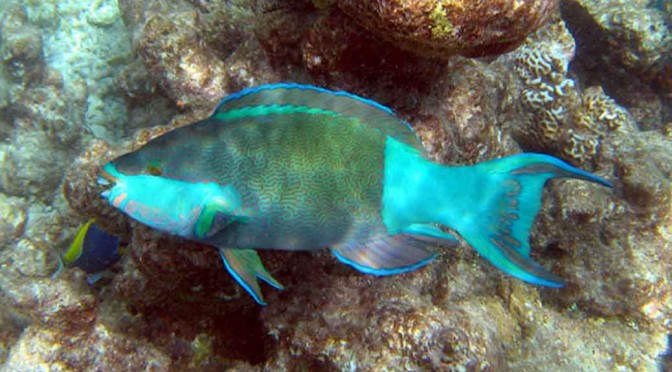By Anupum Pant
Walking on the sparkling white sand on a sunny beach in Hawaii, sounds wonderful, right? Who’d even think, the white sand on Hawaii beaches, which people love walking on, is actually something that is excreted by a certain kind of fish called the Parrot fish…at least most of it – about 70% of it is poop.
Now, I suppose people walking on the beach must be all grossed out. But they shouldn’t be. It isn’t too bad after all. The sand (poop) doesn’t even smell like anything bad. It looks and feels completely fine. There’s actually no reason to be grossed out.
This is how it works…
The Parrot fish spends most of its time eating sea weed and polyps which grows on coral most of the time. When it tries to puck it off, thanks to the protruded mouth of a parrot fish, it scoops off a part of coral too. The coral and sea weed mixes and gets crushed in its throat.
The sea weed and polyps eventually get digested, while the crushed coral comes out as it is. As a result, it poops out the undigested crushed coral.
Interestingly, in the process of taking off a chunk of coral and munching it, the parrot fish does two good things.
Firstly, it helps the coral in removing all the parasites and other things growing on it. The fish is considered to be a natural cleaner of corals. Had there been no parrot fish, corals would have died.
Secondly, the parrot fish does a great service to its own beak in this process. As a result, the beaks don’t grow too much.
The parrot fish eats a lot, and each one of them can produce about 100 kg of “sand” every year. It has been confirmed by scientists that about 70% of the sand that is present on all the tropical beaches has come out of the back side of a parrot fish at some point of time.
This is what a parrot fish looks like and this is how it poops out sand…
Bonus fact: Our planet is old and fresh water is less. So, it’s valid to say that all the water molecules that are there now have passed through something really bad, and there’s a high chance that all of it has passed someone’s urinary tract at some point.
